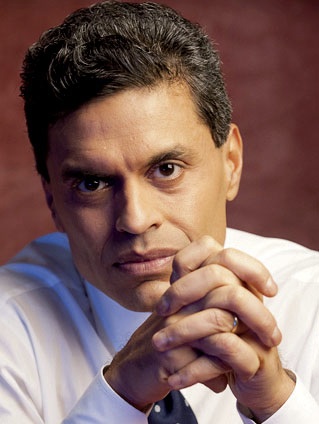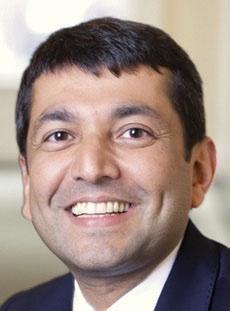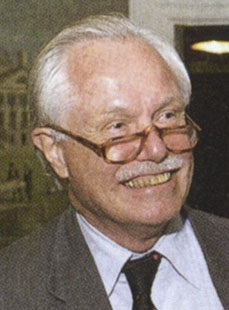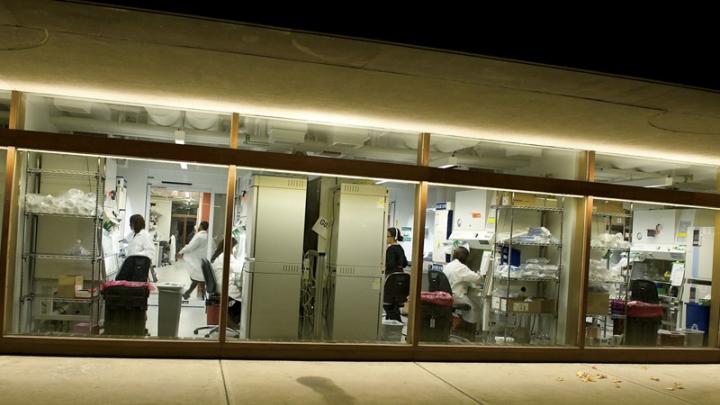Nameless No More
The New College Theatre, a focal point for undergraduate productions—created from 2005 to 2007 by new construction behind, and a renovation of the façade of, the Hasty Pudding Theatricals venue—has become Farkas Hall. Andrew L. Farkas ’82, CEO and chairman of Island Capital Group, a long-time real-estate investor, has endowed the complex in honor of his father, Robin L. Farkas ’54, M.B.A. ’61. Andrew Farkas was president of Hasty Pudding Club during his undergraduate years; his wife, Sandi Goff Farkas, is a playwright. Daughter Arielle S. Farkas is a member of the class of 2013.

Photograph by Kris Snibbe/Harvard News Office
Fareed Zakaria
Zakaria at Commencement
Fareed Zakaria, Ph.D. ’93, will be the principal speaker at the afternoon exercises on Commencement day, May 24. He is host of GPS, an international-affairs program on CNN, editor-at-large of Time, and a columnist for the Washington Post. Zakaria served as editor of Newsweek International from 2000 to 2010, and was previously managing editor of Foreign Affairs. The author of several books on global issues, he is a native of India, where President Drew Faust has scheduled her first visit this January.
Six Student Scholars
Four members of the College class of 2012 have been awarded Rhodes Scholarships to study at Oxford: Samuel Galler, of Boulder, Colorado, and Quincy House, who is concentrating in East Asian studies and global health and health policy (and expects to earn a master’s by Commencement, as well); Spencer Lenfield, of Paw Paw, Michigan, and Eliot House, a history and literature concentrator; Brett Rosenberg, of Chappaqua, New York, and Cabot House, a history concentrator; and Victor Yang, of Lexington, Kentucky, and Winthrop House, a history of science concentrator. Matthews Mmopi ’11 of South Africa, who concentrated in economics, also won a Rhodes. Headed to Oxford as well is new Marshall Scholar James K. McAuley ’12, of Dallas and Currier House, a history and literature concentrator. (Lenfield served as a Harvard Magazine Berta Greenwald Ledecky Undergraduate Fellow during the 2009-2010 academic year, and Rosenberg and McAuley have also contributed personal essays to the magazine; for an index to their pieces, see http://harvardmag.com/2011-student-scholars.)
Enhancing Drug Discovery
Harvard Medical School has unveiled a new program in “systems pharmacology,” a multidisciplinary effort to better understand how existing drugs work at a molecular level and to develop new approaches to drug discovery. The initiative, led by Enders University Professor Marc Kirschner, founding chair of the department of systems biology, and colleagues Timothy Mitchison, Sabbagh professor of systems biology, and Peter Sorger, professor of systems biology, embraces experts in cell biology, genetics, immunology, physics, computer science, and other fields. More than a dozen faculty members are now devoting their energies to the program, and 10 new faculty positions are envisioned.

Photograph by Susan Young
Siddhartha Yog
Funding Faculty
Siddhartha Yog, M.B.A. ’04, who began a career in global real-estate and infrastructure development before attending Harvard Business School, has made the University a gift of $11,000,001 (the final dollar representing a traditional Indian gesture to assure auspicious results). The funds will underwrite the Xander University Professorship (conferred on stem-cell researcher Douglas Melton; see Brevia, November-December 2011, page 59); the Xander professorship of education (to which economist Bridget Terry Long has been appointed); an international financial-aid and fellowship fund at the Law School; and an entrepreneurship-support fund at the Business School. In 2005, Yog founded (and serves as managing partner of) the Xander Group Inc., which focuses investments in real estate and infrastructure in India.
On Other Campuses
Among the applicants to build a high-technology and innovation campus in New York City are a Stanford-City University of New York team, a Cornell-Technion group—both vying for a site on Roosevelt Island—and Columbia (which proposes a data science institute near its main campus); a decision is expected in January.…Yale has announced that some ROTC courses offered there will count for college credit (also the practice at Cornell, MIT, and Penn); Harvard cadets take their military classes at MIT, and do not receive academic credit. Brown president Ruth Simmons, meanwhile, recommended against extending formal recognition of ROTC on that campus.…Princeton is constructing a 248,000-square-foot, two-building complex to house both its department of psychology and its neuroscience institute, and has cleared the site that will be the home for its center for energy and the environment—a 127,000-square-foot facility.…The University of Michigan has announced plans to invest up to $25 million of its endowment in ventures created as a result of research conducted on campus.

Fogg by Christo?
No, that’s not one of the artist’s wrapped buildings; it’s the Fogg Art Museum under cover in early December as the comprehensive renovation and expansion of the gallery, study, and conservation spaces proceeds. The tower crane, anchored in the new below-grade spaces, hints at the arrival and placement of steel for the new structures along Prescott Street, where a new entrance will be created, too.
Nota Bene
Early birds. Having reinstituted an early-action option for the class of 2016, Harvard College received 4,231 applications for admission by the November deadline. Decisions were disseminated on December 15: 772 applicants were accepted, and 2,838 were deferred for regular action with the rest of the applicant pool.
Medical milestone. Nine Medical School and School of Public Health faculty members have been elected to the Institute of Medicine: professor of psychiatry Margarita Alegria; Janeway professor of pediatrics Frederick Alt; professor of health economics Katherine Baicker; professor of biological chemistry and molecular pharmacology George Daley (see “Tools and Tests,” January-February 2010, page 24, on his stem-cell work); associate professor of surgery Atul Gawande (a writer for the New Yorker; see “The Unlikely Writer,” September-October 2009, page 30); professor of medicine Sharon Inouye; Suit professor of radiation oncology Jay Loeffler; Brigham professor of women’s health JoAnn Manson; and Taveras professor of radiology James Thrall.
Corporation casting call. Following the December 2010 announcement that the Harvard Corporation would be enlarged from seven members to 13, an d the appointment of three new members last July, the search for additional candidates has been announced. President Drew Faust, Senior Fellow Robert Reischauer, and three other Corporation members and four Overseers will conduct the effort. Nominations may be submitted in confidence to corporationsearch@harvard.edu. (See “And Then There Were 10,” September-October 2011, page 98.)

Photograph by Jon Chase/Harvard News Office
L. Fred Jewett
“Durable dean” dies. Former dean of Harvard College L. Fred Jewett died on November 27 at the age of 75. He fostered diversity in the undergraduate population during his 35-year career, notably by overseeing the consolidation of the Harvard and Radcliffe admissions offices as dean of admissions and financial aid (1972-84), and by randomizing the assignment of upperclassmen to the residential Houses as dean of the College (1985-1995).
Research revenues. The Wyss Institute for Biologically Inspired Engineering (see “Designing from Life,” May-June 2011, page 46) has been awarded $12.3 million by the Defense Advanced Research Projects Agency to develop a treatment for sepsis; injured soldiers are frequent victims of the bloodstream infection. Separately, nine researchers received $15 million in National Institutes of Health grants aimed at fostering especially innovative work (Transformative Research, Pioneer, and New Innovator awards); the largest grant, for $8.2 million, went to professors Jeff Lichtman, Markus Meister, and Joshua Sanes—all of molecular and cellular biology—plus Sebastian Seung, of MIT, to develop a technology to map brain circuits more rapidly.
Miscellany. To mark its eightieth anniversary, the Woodberry Poetry Room launched a website where users can hear its collection of archival recordings of poetry readings: hcl.harvard.edu/poetryroom (use the “Listening Booth” tab).…Cogan University Professor Stephen Greenblatt won a National Book Award for The Swerve, his exploration of the roots of the Renaissance (see “Swerves,” July-August 2011, page 8). Other nominees included poets Adrienne Rich ’51, Litt.D. ’90, and Carl Phillips ’81, and fiction writer Edith Pearlman ’57. Poet John Ashbery ’49, Litt.D. ’01, received the Medal for Distinguished Contribution to American Letters.








